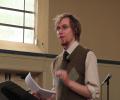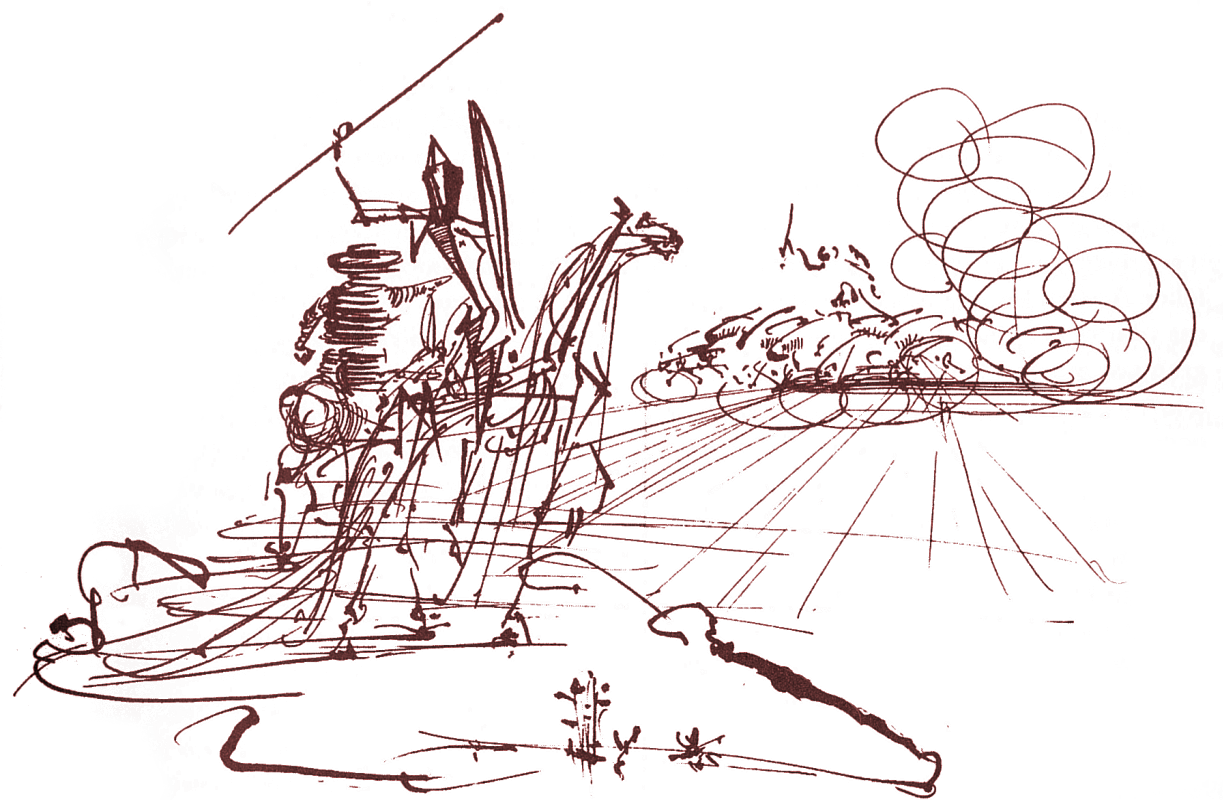Preached this sermon on June 2nd, 2013 at Mosaic Church of the Nazarene.
Download MP3 file.
Click for the text of the Scripture readings.
Transcript (please excuse typos!): Our scripture today sounds like a cacophony, does it not? All those voices. Job, scratching his sores in the ashes of his life with a shard of broken pottery. Elijah, splitting a bull into four blood-soaked pieces and calling down the fire of God to defeat the prophets of Baal. Sort of a my-God-is-bigger-than-yours. St. John of Patmos telling us that if we trust ourselves to the sword we will be slain by it. And then the Roman centurion. The boss. He recognizes power in Christ because he himself has power on earth. Heal my servant! he says My earthly power is profane next to yours. And Jesus does.
 So what does it mean?
So what does it mean?
This sermon is about victory, about "evangelion." Evangelion is the greek word we translate "gospel." Evangelion means "tidings of victory." Evangelion is embodied by the risen Christ that leaves the tomb empty and echoing.
Evangelion. Evangelion. Tidings of victory. Sounds good, doesn't it? You and I both want to sign up for that army.
And that's the irony. Evangelion in the narrative of Christ turns everything on its head. For the victor was killed in the most shameful way possible, in the manner that Rome made a lie of all the prophetic insurrections that plagued the first century. For how could a dead prophet declare victory? No, a dead prophet is a mockery. A dead prophet no longer speaks, a dead prophet hanging on the cross will never herald the victory of God. Another dead prophet that promised God would defeat the Romans and break the bondage of the poor and the oppressed. Another dead prophet that challenged Rome. Right?
At first blush that's what Job's story looks like. Or does it?
What does victory look like for Job? What does victory look like for the parapalegic? What does victory look like for the single mom who works at Burger King? What does victory look like for the factory employee or for the office worker staring for hours at spreadsheets, forgotten cogs in giant machines?
Sure, victory for the centurion is clear. Jesus heals the centurion's servant. And this is what most of us want, isn't it? We want to pray with faith in the Authority of The Risen Christ and receive healing for those that we love, for those that are in our care. And why not? We're asking for good things, not for ourselves, but for others. Faith in, miracle out.
But ask yourself, does it work like that for you?
What does the victory of the risen Christ look like in the here-and-not yet? For we are living in the here-and not-yet in our age. We are products of an age that has been told of the the coming of the Messiah, his presence revealed to another time by signs and wonders and recorded for us in Scripture. We even hear of miracles in other, mainly developing world nations. But we are more like the faithless age that will not dance. We don't see wonders sometimes, no matter how hard we pump our legs our exhaust our voices. God's presence is at times hidden, submerged, recognizable in the faces of the poor and in the kindnesses of friends and neighbors but not in healing acts of power.
Victory is not proclaimed in our age in ways that silences doctors and atheists. We don't get to be Elijah pouring water on a quartered bull. Wouldn't it be nice, though? Surely some signs and wonders would turn around this cold age of machines and money?
So what does victory look like if not like Elijah lighting on fire a bull before all the prophets of Baal?
What does victory look like in the here-and-not-yet? What does victory look like in a world that, despite our wealth, looks no less just than the worlds of the past?
Victory, my friends, is not money. Victory is not good health, like Job's before his fall. Victory is not free time, leisure, or beautiful children. Victory is not hot husbands and wives. Victory is not power, as in the centurion's power, as in the CEO's power. Victory is not the sword, as St. John cautions us. Victory is not good food. And victory is not super-stretchy and tanned yoga legs. Victory is not success. These are the victories of the world!
Victory in our world is success, and we all know what success looks like because a thousand corporations have standardized and regularized success, depicting it in a thousand commercials and in a thousand movies.
Success is super hot, and we are not.
Success can be bought and owned. Success is money-in success-out. Success judges us as lacking and then draws us into the labor of sisyphus: the hamster wheel of never-enough. We are never able to become the seducing videos of perfection so we keep pressing the gas pedal on our lives, on the economy, our politics.
What does success look like for Job? Maybe I'll answer my own question this time. Right? Job's righteousness in his health was the victory of faithfulness.
How can you tell Job was righteously faithful? Here's how. the rich Job and the poor Job would have really hit it off. I bet you that if the rich Job met the poor Job, the poor Job would've been put to work on the rich Job's farm and would have managed things so well he'd have ended up rich again. you see, job was a guy that took care of his neighbors and took care of the poor. But when Job ended up with nothing... there was no rich Job to care of poor Job. There were just three faithless friends who showed up to tell him that he was poor because God was angry at him.
Three judgy dudes who show up to tell their friend that that God's victory is represented by material wealth.
Three accusers to who tell job that wealth is given by God as a reward for just and compassionate living. Who tell Job that he has sinned and he deserves his lot. (and one son of the three judgy friends for good measure.)
Imagine these guys today. They'd tell any of us who were sick that we needed more faith. They'd tell the poor that they were unrighteous and lacking in faith. You ever met these guys? Yeah. Just have more faith. Input faith, output miracle. God is like a function that changes faith to miracles.
See when we think: in faith, out miracle we reduce the living God to a machine, a system, a code: the Law.
One of the marks of the modern thinking is the replacing of biological metaphors for the with machine metaphors. Think about it. Machines are systems, and computers run on code.
This is terribly sneaky and subversive. It shapes our whole view of God, nature and biology without us being conscious of another set of metaphors.
Where Paul talks about the spirituality of the Roman empire, we talk about the American system. We talk about tweaking our economic system to give us more just outcomes, the way you tune a carburetor. We even look at our own bodies and see a machine that runs on calories, protein, and sugar. We think of the land like a machine that converts fertilizer and water into crops. Companies think of employees like machines: input money output productivity. It's all transactional, the way you put gas in a gas tank or exchange money for a product.
And yes, this is basically how the three judgy friends of Job think of God, as the keeper of a code. A lawyer. A switchboard operator. When we expect miracles commensurate to our application of faith, we don't treat God as a being who loves us, who calls us into relationship. We treat God as a machine. A giant gum-ball machine in the sky. We insert a quarter (our faith) and god grinds and cranks out a miracle.
For the best analogy for God we have is that of the loving parent. In our age, that would be man or woman, but in a patriarchal time when men were the heads of the house, God was seen as the householder of the universe, that is, the Father. But the point is that God is like a person. God is personified in Jesus Christ.
We have to preserve the radical freedom of God. God is free, a separate being. God will say "yes" and God will say "no." God will not perform for the microscope.
We must preserve the The being-ness of God. The relationality of God. The personhood of God. Even though all of our ideas about the world seek to turn even our beautifully mysterious biology into machines.
Ultimately, many of us wish for a machine God. It's too hard to imagine a god that doesn't follow the rules of faith. That doesn't give us prosperity when we pray right. That doesn't heal when we input faith. That doesn't do: faith in miracle out. So we stop believing in God's healing work, in God's victory over sin, death, and sadness, the way we stop believing in a scientific axiom that sometimes works and sometimes doesn't. But we can't love a machine. And a machine can't love us.
So if victory isn't a well-oiled god machine... what does victory really look like?
Victory is the supernatural power to love our enemies as ourselves. Victory is loving our neighbors, and not just in a mushy, feelings way. Victory is loving out neighbors with our stuff, by aiding them in need, Victory is feeding the hungry, Victory is visiting those in prison, victory is giving water to the thirsty. Victory is loving well within our means. Victory is remainign faithful to God in spite of all the swords, faithless friends, patriarchy, gangs, drugs, catty backstabbing, racism earthquakes, judgement, job losses, Rebecca Black songs, shallow politics, lusts, and Richard Dawkins videos on YouTube.
Victory like this establishes a little alternative economy, a little church, a little outpost of the kingdom where love can gain a foothold and spread.
There is a word for our faithfulness to God. It is one of my favorite words. But I don't get to use it that much because it's Greek. It's hupomone and it means literally "to remain under" or "faithfulness under blows," or "iron intransigence, unwillingness to renounce one's faith in the face of torture." It often gets translated "endurance" "patience" or "steadfastness."
That's Job's victory for you, friends. Hupomone. Remaining faithful through wealth and poverty. Remaining faithful when God doesn't restore his health.
Friedrich Nietzsche has a saying, "The essential thing ‘in heaven and earth’ is that there should be a long obedience in the same direction; there thereby results, and has always resulted in the long run, something which has made life worth living."
The book of Revelation tells us that
"If you are to be taken captive,
into captivity you go;
if you kill with the sword,
with the sword you must be killed.
Here is a call for the endurance and faith of the saints."
That is to say, being taken captive may be our lot, and if we play the game of swords (or the game of thrones for that matter) then we die by the sword. Our endurance or hupomone is to hold fast to our unwillingness to wield the sword. A long obedience in the same direction.
That is, our endurance is the revolutionary power to love our enemies as ourselves. The book of James uses the metaphor of roots. Hupomone is to remain rooted, like the roots of an oak that twines deep into the soil. Hupomone is a long obedience in the same direction. Our rootedness helps us to remember that we are Children of the living, loving God even in the midst of suffering.
It does not say that we will be raptured into a secret place in our hearts where we will not feel pain or suffering. Surely that wasn't Job's lot! We are to be faithful unto death, even unto death on a cross. Amen?
So how does the centurion fit in here? Where does the healing of God fit in? Folks, I think this is the hard part for many of us. For me, it's hard to see God healing a Roman centurion, that is, one who wields an axe-like blade for the demon-empire that will ultimately crucify Jesus. The empire that invented "bread and circuses." Sure, Matthew tells us that this centurion built the Jewish temple. But you can be sure that his sword has run with the blood of the innocents. And that's my judgy side showing.
The book of Job makes the ample point that all humans have sinned in the eyes of God, and are unrighteous. That is clear.
Which makes Jesus' healing of the centurion all the more spectacular. All the more a gift.
God's love through Christ is a gift that penetrates all of our traumas and pains and allows us to feel what it would be like if our parents and friends truly loved us in whole. God's love for us is the love that we might imagine if we could. It touches us and says, "you're f'ed up, and I love you anyways." It's this grace that allows us to begin the journey towards holiness. And it's our memory of these moments of grace that allow us to remain rooted in times of trial. We are to dig our roots deep into the love of God, the love that God offers us even now. A long obedience in the same direction.
Can you feel the love of God lifting up on your heart? Can you hear him speak into your life and say, "you are loved. I love you. Come into this community fully and be exactly who you are. I will help you walk the path. I free you from your shackles of self-reproach, from your imagined failures. You are perfect and I will perfect you." Amen? Can you accept this love? Can you live in this freedom? Doesn't this terrify you? Can you see how Christianity looks like a lawless religion?
Folks, this doesn't happen today in church. Jesus doesn't reach a spiritual finger down and unlock your power to live like the "slide to unlock" on an iPhone. And because the working of the Holy Spirit is so slow (sometimes fast, yes, but mostly slow) it requires both revolutionary patience and fidelity. Everything in our society is instant. But the transformation of God's love takes years or decades to work. Before anyone will notice. Before you may even feel peace. Can you wait a decade to feel peace? This is what Christ calls us to. Yes, Holy Spirit transformation takes time, but it is sure. If you remain faithful, God will transform you through his love.
It is our struggle to learn how to accept this love, how to live into this eternal presence of the Holy Spirit, rooted in love despite all the blows, despite richness or poverty. Despite the trial and testing of Job.
And this is how love moves into communities and expands outwards. It does not "trickle down" from governments or economies. It trickles up from communities that root themselves in the love of Christ and learn to love one another. And they draw from that nourishing love, and put their hands and feet into the work to provide for one another. We give one another grace, peace, and rest as God has given to us.
And when we do live into this, we can experience the holy rest, the peace of wellness, the peace that GRACE ALONE can give us. For we know that the three judgy friends of Job, the law, and the entire system of success stands in judgement of us. But as our elder brother Paul tells us, there is no condemnation now in Christ Jesus.
It is only through the love of God that we can be given the victory of fidelity to Jesus, The victory of hupomone, a long obedience in the same direction.
Victory is being given the power to follow in the footsteps of Jesus Christ, the murdered prophet who was raised again.
Amen.









